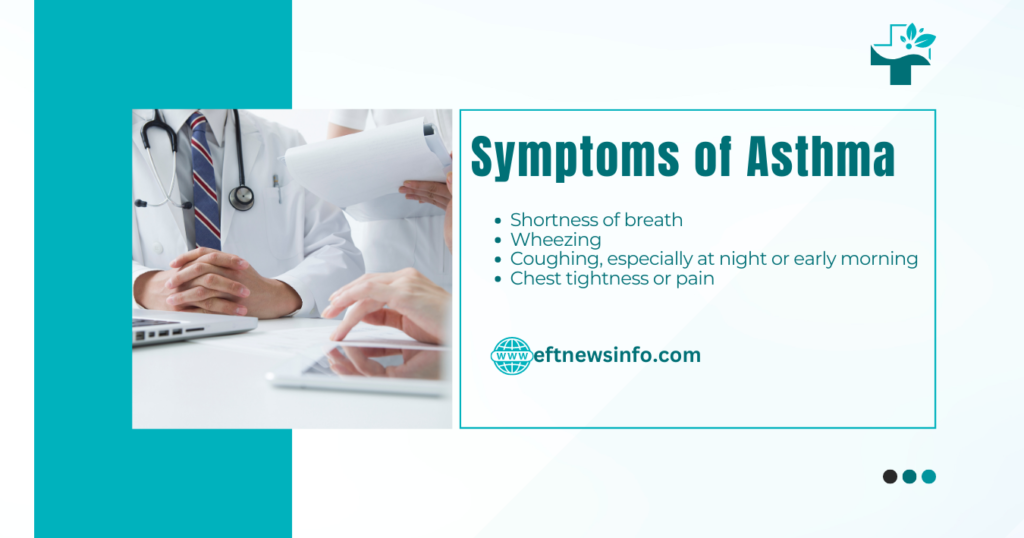Living with asthma can be challenging, but with proper management and understanding, individuals can lead fulfilling lives. In this article, we will explore the symptoms, triggers, and treatment options available for individuals living with asthma.
Table of Contents
Introduction: Understanding Asthma
Asthma, a prevalent chronic respiratory disease, impacts millions of individuals across the globe. It is characterized by inflammation and constriction of the airways, leading to breathing difficulties. The manifestation of asthma symptoms can differ from person to person, emphasizing the importance of comprehending these indicators for successful management.
Common Symptoms of Asthma

People with asthma may experience various symptoms, including:
- Shortness of breath
- Wheezing
- Coughing, especially at night or early morning
- Chest tightness or pain
It’s important to note that asthma symptoms can range from mild to severe, and they can vary in frequency and intensity for each individual.
Identifying Asthma Triggers
Asthma triggers are substances or situations that can worsen asthma symptoms or even trigger an asthma attack. By understanding individual triggers, people with asthma can take proactive steps to minimize their exposure and reduce symptom flare-ups.
Allergens as Asthma Triggers
Allergens such as pollen, dust mites, pet dander, and mold spores are common triggers for individuals with asthma. When exposed to these allergens, the immune system reacts, leading to inflammation in the airways and subsequent asthma symptoms. Taking measures to minimize exposure to allergens can significantly improve asthma control.
Environmental Triggers and Asthma
Apart from allergens, various environmental factors can trigger asthma symptoms. These can include:
- Air pollution
- Tobacco smoke
- Strong odors or fumes
- Cold air or changes in weather
- Respiratory infections
By being aware of these triggers and taking appropriate precautions, individuals can reduce the likelihood of asthma exacerbations.
Understanding Exercise-Induced Asthma
Exercise-induced asthma, also known as exercise-induced bronchoconstriction, is a condition where physical activity triggers asthma symptoms. It typically occurs during or after exercise and can make it challenging for individuals to engage in physical activities. With proper management and preventive measures, people with exercise-induced asthma can still enjoy an active lifestyle.
Managing Asthma Symptoms
Effective asthma management involves a combination of medication and lifestyle modifications. By working closely with healthcare professionals, individuals can develop a personalized asthma management plan. This plan may include:
- Identifying and avoiding triggers
- Taking prescribed medications as directed
- Monitoring lung function with peak flow meters
- Keeping regular medical appointments for asthma check-ups
By following the management plan consistently, individuals can experience better control over their asthma symptoms.
Inhalers and Medications for Asthma
Inhalers are a common form of medication used to treat asthma. They deliver medication directly to the airways, providing quick relief during asthma attacks or managing symptoms over the long term. Different types of inhalers are available, including:
- Short-acting bronchodilators (relievers)
- Long-acting bronchodilators
- Inhaled corticosteroids (controllers)
The choice of inhaler depends on the severity and frequency of asthma symptoms and should be determined in consultation with a healthcare professional.
Long-Term Asthma Management
Asthma is a chronic condition, and long-term management is crucial for preventing symptom flare-ups and reducing the risk of complications. In addition to medication, individuals can incorporate lifestyle changes to improve asthma control. These may include:
- Avoiding tobacco smoke and quitting smoking
- Maintaining a healthy weight
- Eating a balanced diet
- Regular physical activity
- Managing stress levels
By adopting a comprehensive approach to asthma management, individuals can lead healthier lives and reduce the impact of asthma on their daily activities.
Asthma Action Plans
Asthma action plans are personalized guidelines that outline how individuals should manage their asthma. These plans include information on daily medications, triggers to avoid, and steps to take in case of symptom exacerbation or an asthma attack. Following an asthma action plan empowers individuals to take control of their condition and respond promptly to changing symptoms.
Alternative and Complementary Therapies
In addition to conventional medical treatments, some individuals may explore alternative and complementary therapies to manage their asthma symptoms. These may include:
- Breathing exercises and techniques
- Acupuncture
- Herbal remedies
- Yoga and meditation
It’s important to note that while some individuals may find these therapies helpful, they should always be used in conjunction with medical advice and not as a substitute for prescribed medications.
Asthma in Children
Asthma can affect people of all ages, including children. Childhood asthma requires special attention, as symptoms and treatment options may differ from those of adults. Parents and caregivers should work closely with pediatricians or asthma specialists to develop an appropriate asthma management plan for children.
Asthma and Smoking
Smoking and exposure to secondhand smoke are detrimental to lung health and can significantly worsen asthma symptoms. Quitting smoking and creating a smoke-free environment is crucial for individuals with asthma. By doing so, they can reduce the frequency and severity of asthma exacerbations.
Traveling with Asthma
Traveling with asthma requires some additional planning and precautions. It’s important to:
- Carry sufficient medication and backups
- Research healthcare facilities at the destination
- Obtain necessary documentation for carrying medication
- Be prepared for changes in climate and environmental triggers
With careful planning and proactive measures, individuals with asthma can enjoy travel while minimizing the impact on their respiratory health.
Conclusion
Living with asthma may present challenges, but with proper management and understanding, individuals can lead fulfilling lives. By recognizing symptoms, identifying triggers, and following personalized asthma management plans, individuals can gain better control over their condition. It’s important to work closely with healthcare professionals and stay informed about new developments in asthma management for optimal care.
FAQs
- Is asthma curable? Unfortunately, there is no cure for asthma at present. However, with appropriate management, asthma can be well-controlled, allowing individuals to lead normal lives.
- Can stress trigger asthma symptoms? Yes, stress can be a trigger for asthma symptoms in some individuals. It’s important to manage stress levels through relaxation techniques and seeking support when needed.
- Can asthma be hereditary? There is evidence to suggest that asthma can have a genetic component. If one or both parents have asthma, their children may be at a higher risk of developing the condition. However, it’s important to note that not all individuals with a family history of asthma will develop the condition themselves.
- Can diet affect asthma symptoms? While there is no specific diet that can cure asthma, certain foods and dietary factors may influence asthma symptoms. Some individuals may find that certain foods, such as dairy products or sulfite-containing foods, can trigger their symptoms. It’s important to pay attention to personal triggers and maintain a balanced diet to support overall health.
- Can asthma go away on its own? Asthma is a chronic condition, and while symptoms may come and go, it does not typically go away on its own. With proper management and treatment, individuals can achieve good control over their asthma and minimize symptom flare-ups.
- Is exercise recommended for individuals with asthma? Yes, exercise is generally recommended for individuals with asthma. Regular physical activity can improve lung function and overall fitness. However, it’s important to take precautions, such as warming up before exercise, using a reliever inhaler if needed, and avoiding exercise during symptom flare-ups.
- Can asthma medications cause side effects? Like any medication, asthma medications can have potential side effects. However, the benefits of controlling asthma symptoms generally outweigh the risks of side effects. It’s important to discuss any concerns with a healthcare professional who can provide guidance on medication use and monitor for potential side effects.
- Is it safe to use complementary therapies alongside asthma medications? While some individuals may find relief from complementary therapies, it’s important to consult with a healthcare professional before using them alongside prescribed asthma medications. Not all therapies have been scientifically proven to be effective, and they should never be used as a substitute for prescribed treatments.
- Can asthma limit daily activities? Uncontrolled asthma can indeed limit daily activities and impact quality of life. However, with proper management and treatment, individuals with asthma can engage in regular activities, including work, exercise, and hobbies, without significant limitations.

